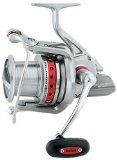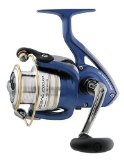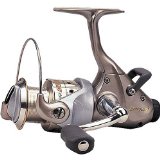Ocean Surf fishing can be a rewarding and fun style of fishing. It
is also a very cheap way to fish.
No need for expensive boating equipment. All thats required is a good
surf rod, a proper suitable reel and the right lines.
Here comes a little "how to surf fishing" guide.
For a starter you need to get the right equipment.
Lets start with the surf casting rod.
There are plenty of rods to choose from.
A 4 meter long
graphite-composite rod should fit most needs.
A choice needs to be made depending if one favors a spin or an overhead
rod.
Most fisherman seem to go for spin rods.
They have larger first, second and third guides and fewer guides
overall.
Okuma has a good range of some nice qualtiy rods, for example the
OKUMA FISHING TKL CO (SS-S1102H1 ) Speciality Rods SOLARIS 11' HVY SURF SPIN ROD
Depending on the rod choice, a matching reel needs to be selected.
Most popular surf fishing reels are large spinning reels with long cast
spools, which will match a good spinning rod.
Some money should be invested to buy a good quality reel with long cast
alloy spools and
three or more stainless steel ball bearings. Otherwise the achievable
casting distance might be to low.
Also low cost reels will have a much shorter life span.
Very popular with experienced surfcasters are the Alvey side cast reels, such as the
Alvey Casting Reel (700c5)
They are extremely durable and reliable. They feature direct one-to-one
retrieves.
Overhead reels and rods are much more vulnerable to damage from sand
and salt.
They will cast nicely but would only suit very experienced surf fishers.
You could go for a real professional high quality reel, such as the Saltiga Surf Spinning Reel.
Or perhaps choose a cheaper alternative to start with, such as the Daiwa Regal Spinning Reel.
| Saltiga Surf Spinning Reel | Daiwa Regal Spinning Reel | Okuma Epixor | Alvey Casting Reel |

|
 |
 |
 |
Once you picked a good surf fishing rod and reel you'll just need to
find a matching line.
The lighter the line the longer they will allow you to cast.
But if the terrain is rough with rocks and heavy surf you might need to
get a thicker line.
A 6 - 8 kg line should work fine for clean sandy beaches.
Even though most surfcasters go for nylon, I would recommend to give
superbraid a try.
It will handle much lighter and allow longer casts. It has a very fine
diameter, low stretch and
super strength.
Depending of what fish you are going to target you will need to choose
the right hook size.
Anything between 1/0 and 7/0 could be suitable.
I prefer circle hooks, because fish will hook themselfes and the hook
sets nicely in their mouth.
This avoids gut hooking and you will be able to release fish safely.
Another essential tool is bait elastic. If using soft baits such as
mussels or frozen fish pieces they
need to be tied to the hook, otherwise they will most likely fall off
during the cast.
Another helpful trick is to use shock leaders. They are tied to the
mainline and should be long enough to
wind onto the spool. They will prevent break offs during the cast.
Rigs for surfcasting can be bought pre-tied. But the cheaper
alternative would be to tie a few dropper rigs ore running rigs
before setting out on a trip.
I normally use a dropper rig with a torpedo sinker. I rough sea and
surf breakout sinkers should be used.
They have metal times that will dig into the sea floor and prevent the
bait from being carried away.
Most successful surf fisherman will use freshly caught bait. Frozen
baits can be used as well.
Even soft baits such as peeler crab and sand worms will give good
results.
But the bait presentation is very important. Also the smell of fresh
bait is important.
You cant cover a huge area when casting into the surf. So you need to
make sure that the fish will find your bait.
If you managed to hook a fish, always keep pressure on the line.
Kill your catch immediately if you want to keep it and ice it down.
Otherwise take care when handling the fish and release it smoothly.
Remember it is a living creature and deserves to be treated with
respect.
Good spots for surfcasting are generally around river mouths.
Read the beach and try to locate holes where fish can feed. These are
normally indicated by
smooth patches of water. Channels and drop-offs around sandbanks are
also spots to look out for.
Check fishingreminder for best times to go fishing. Try to fish at
major or minor times or at the turn of the tides.
No comments yet. Be the first to comment!